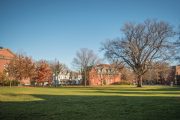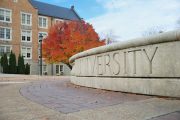
The flyer in the girl’s backpack urged people to join a protest “against the unjust systems that allow police officers to kill Black men and boys with impunity.”
The girl is seven years old.
Her name is Alana, and she was part of a group of 20-plus second-graders from the Alma Del Mar Charter School protesting during recess in New Bedford, Massachusetts, on December 12. With their focus largely being the Michael Brown shooting, they stood outside their school chanting, “Honk if you want justice” and holding placards expressing sentiments such as, “Please don’t shoot me, Ferguson.”
School officials said the protest was “voluntary” and instigated by the “scholars” — that’s what they called the second-graders. As WHDH.com wrote, “‘They couldn’t do anything that would be anti-police or anti-any particular people. The scholars agreed to that and they asked the principal for permission as well,’ Will Gardner, executive director of the Alma Del Mar Charter School, said.”
Gardner is also quoted as stating, “It wasn’t something the teacher planned.” The teacher is identified as Shabrina Guerrier, and is black. “It was something the kids did,” Gardner continued.
This claim strains credulity, say many parents. One of them is New Bedford police officer George Borden, father of little Alana. The Boston Globe reported that he said, “I don’t think 7-year-olds can come up with the idea to go out and protest on the street.” Furthermore, Borden told WHDH that the “anti-police” material in the flyer was “horrific to me” and said that he didn’t know his daughter would be engaging in a protest; he only learned of it from a friend who happened to drive by and see the event. Writes WHDH, “‘Having the children off school property without any parental permission slip is inexcusable,’ Officer George Borden said. ‘I found that extremely upsetting, multiple people I’ve spoken to felt the same way.’”
This certainly is reflected in the comments section underneath the WHDH article. For example, addressing what many characterize as school bias and indoctrination, one commenter wrote:
So if next week Little Johnny wants to hold a pro-life or pro-choice protest in front of the school, or a gun rights rally, or say a Penny drive to support religious freedom in schools, I am sure the teachers and principal would happily embrace that too because the kids asked to do it — at the age of 7. Right … the truth is this protest and lesson plan was 100% the result of a teacher pushing their own political agenda on their very young and impressionable students.
And the impression they’re being given is very clear to Officer Borden. The first thing his daughter said to him after the protest was, “Daddy, do you shoot people?”
Many observers would characterize this as educational malpractice. After all, forensic evidence and the testimony of black eyewitnesses vindicate the account of Darren Wilson, the former Ferguson police officer who shot Michael Brown, and a grand jury analyzed the evidence and refused to indict Wilson. In addition, the world has seen a video of Brown violently robbing a convenience store just prior to his confrontation with the officer. Given these facts, some may ask: Does truth matter at all anymore in modern education?
And they might ask the same about accountability. For students at many colleges and universities are now asking for discrimination — in their own favor — because they participated in protests. Writes 5 ABC:
Students at Oberlin College are seeking a “pass” when it comes to this semester’s grades.
Many of the students have been out protesting since the summer and missed important classes and assignments.
As a result, many may end up flunking their course. Students asked college president Marvin Krislov to suspend the standard grading system.
So now more than 1,300 of Oberlin’s 2,900 students signed a petition asking that the lowest grade issued be a C. The petition states that the undergrads “would really like to see the normal grading system suspended for this semester and replaced with a no-fail mercy period.” The students also requested that instead of writing papers, they be allowed to simply meet with their professors in groups and discuss their paper topics. (Given that the second paragraph of their petition is one run-on sentence without punctuation, some might conclude that the last thing the students need is a dispensation from writing assignments.) The petition states in addition that no student — “especially black students and students of color” — “should be failing a class this semester.”
While Krislov would not suspend the grading system, he has made numerous concessions to the petitioners.
And Columbia University law school interim dean Robert Scott had already followed this course. Earlier this month he issued a statement pointing out that, in accordance with school policies already in place, law students may have their final exams postponed if they “feel” they’ve suffered trauma resulting from the two recent grand-jury decisions, the Ferguson one and that concerning the Eric Garner arrest in New York City. Scott announced this in a message that read, in part:
The grand juries’ determinations to return non-indictments in the Michael Brown and Eric Garner cases have shaken the faith of some in the integrity of the grand jury system and in the law more generally. For some law students, particularly, though not only, students of color, this chain of events is all the more profound as it threatens to undermine a sense that the law is a fundamental pillar of society designed to protect fairness, due process and equality.
And the same stance on exam postponement was taken at Georgetown and Harvard universities. At Georgetown, a request for such was made in a letter titled “From Students of Color: An Open Letter to GULC Administration, Staff, Faculty, & Students.” Part of it reads:
Your silence is suffocating. We, students of color, cannot breathe. At Georgetown University Law Center (GULC), law students of color are underserved, unacknowledged, and unable to seek relief from our institution of legal education.
“Law is but the means, Justice is the end.”
That is the creed, the very motto of Georgetown University Law Center.
… We continually lose hope in our study of the law because we attend a legal institution that has neither openly acknowledged or denounced the current legal (in)justice system that oppresses Black and Brown people.
The petitioners then ask, expressing cynicism about the system of law they’re being taught, “Why are we trying to wield tools that were never meant to fit our hands?”
At Harvard Law School, a similar letter to Dean Minow and Harvard Law School administration signed by the “Harvard Law School Affinity Group Coalition” (a collection of minority groups) uses much of the same language and states, in part:
Your silence denies humanity to the lives lost and minimizes the gravity of the palpable anguish looming over campus.… We are traumatized. Just because this racial terror is systemically reproduced and normalized through repeated fidelity to the so-called rule of law, it does not mean the disruption is any less traumatic than a tragic bombing. The fact that you refuse to openly acknowledge this adds to our distress. Your silence is a signal that Harvard Law School is indifferent to the welfare of many of its students.
We can’t breathe.
Yet outside the ivory towers of these two Ivy League schools, and Georgetown and Oberlin, such melodrama often evokes a different reaction. One commenter under a Daily Caller piece about Columbia expressed the thoughts of many, asking, “What possible good is a lawyer that cannot compartmentalize and set aside one’s own feelings and emotions to behave with competence?” Another wrote, “People traumatized by law cases shouldn’t be going into law.”
And some might wonder something else. Abraham Lincoln once said, “The philosophy in the schools today will be the philosophy of government tomorrow.” Given this, and the fact that so many in politics are lawyers,might allowing the graduation of law students who scoff at “fidelity to the so-called rule of law” explain something about our politicians?




